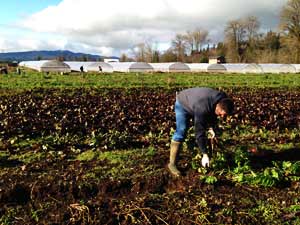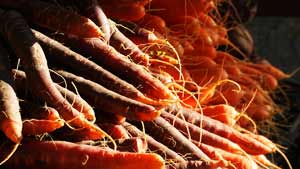by Kathleen Bauer
When it comes to farming through the winter months, Tom DeNoble of DeNoble’s Farm Fresh Produce in Tillamook is no romantic.
“Winter farming is a big gamble,” he said. “It’s like rolling the dice every year.”
But give him a choice between a height-of-summer carrot and one pulled out of the ground in January, and it’s no contest. He’ll choose the winter carrot every time. According to him, the quality of winter vegetables is just as good or even better than in the summer, though they may not be quite as pretty.
That’s because cold temperatures cause the plants to produce sugars that act as antifreeze, making them taste sweeter. And because they’re also growing more slowly, they develop more intense flavors.
DeNoble started farming by growing calla lilies, which sounds like a natural, since callas grow wild, flourishing in the wet, temperate climate of the Oregon coast. But he realized quickly that growing them in density, as they had to do to produce enough for market, made the flowers more susceptible to disease.
That’s when he decided to start supplementing the farm’s output with artichokes, and how DeNoble’s came to be synonymous with high-quality varieties, from fat globes as big as cantaloupes to purple-leaved beauties to some as tiny as a baby’s fist. Eventually the bottom fell out of the flower market, but customers couldn’t get enough of the farm’s produce. So he tilled the lilies under and planted a variety of vegetables that would do well and that customers would want to buy.
Carrots became a huge hit and grew well in the rich soil of the former dairy with its century-plus layering of rich manure and salt from the ocean breezes. DeNoble also switched from wholesaling his crops to selling direct to customers at area farmers’ markets, finding he was able to sell more that way, as well as make a decent income growing crops he loves.
But to him, even the physical hardships of farming during the winter don’t sway him from farming, a career choice he says he finds deeply satisfying.
“When I walk into a field I look at everything as something that Mother Nature has created but I’m helping nurture along, whether I’m hauling compost to the field to feed the soil or if I’m giving it water,” he said. “We’re looking out for the land, number one, and looking out for the people, number two. And, you know, in return they seem to be taking care of us fairly well.”
Kathleen Bauer is a freelance writer in Portland, Oregon, focusing on agriculture and field-to-plate issues. Her blog, Good Stuff NW, is about her journey to connect the dots between what happening in the field and what she’s putting on her table, including stories about people who are making a difference in our local food system, about eating sustainably and locally, and about the political issues affecting the food we find at our markets and stores.
Most of the videos featured on Cooking Up a Story were produced, filmed, and edited by Rebecca Gerendasy. Fred Gerendasy contributed as a writer to many of the posts and occasionally as the interviewer. Visit Rebecca Gerendasy Clay – Art and Fred Gerendasy Photography to see their current work.


